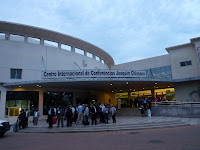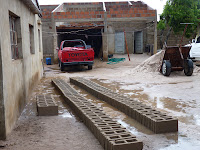
The organizers had identified four different sites for field visit and each participant has to sign up for one. The visit took place on 17 November. I asked advice from Alessandro Marini the CPM for Mozambique who knows better the projects in the country and I chose to join the group II to visit a Microcredit branch and one of its clients as well as the Maragra Sugar Company.
It rained all long the night before and continued raining all the day of the field visit. Although the rain, we were all ready at 7 am at the conference centre but the buses to pick up each group were not there. It is now 8:30 am, the organizers were a little anxious; some participants started saying “if we have to leave late, why we wake up early to be here at 7 and no transportation available”. Some thought that the field visit has been cancelled due the rain. But no field visit! No successful implementation workshop. Later, we discovered that the transportation company contracted has also an on-going contract with another company to collect the workers from their place to the work place. So they must first drop the workers before the field visit. In Africa time is “not money” and everything can be fixed. At 9 am, the first bus arrived followed by others.
We can finally leave Maputo. After one and half hour we arrived at Manhiça where the CEO of MicroCrédito Mr Alfredo Chilaule was waiting for us.

He welcomed the group and made a short presentation on the Microcrédito. Microcrédito, established on 18 May 2009 is a private business entity and has 5 shareholders. It benefited from an incentive of the Government of Mozambique through the IFAD supported Rural Finance Support Programme to encourage a private sector to open a financial services bureau in rural areas: Manhiça, Xinavane, Marracuene, Ponta de Ouro, Magude, Chicualacuala and Maputo.
 The main activities of Microcrédito are to provide loans for commercial enterprises business, agricultural based enterprises, construction works, capacity building and training. Before providing loan to the poor people, they provide them with training on how they can manage the loans. The loan portfolio of Microcrédito Manhiça Branch was US$ 21,000 in May 2009 when started activities. In one year Microcrédito has a portfolio of US$ 500,000 and has 100 clients and 56% are women. “Women pay back the loans. You do not need to give them a call to remind them the repayment date. They are already at the door waiting before I arrive in office” said Alfredo Chilaule. The loan period is 14 months with the interest from 4 to 6.5% per month. One of the conditions to get a loan from Microcrédito is that the borrower has to use the loan for commercial or agricultural activities and commit to recruit at least one employee.
The main activities of Microcrédito are to provide loans for commercial enterprises business, agricultural based enterprises, construction works, capacity building and training. Before providing loan to the poor people, they provide them with training on how they can manage the loans. The loan portfolio of Microcrédito Manhiça Branch was US$ 21,000 in May 2009 when started activities. In one year Microcrédito has a portfolio of US$ 500,000 and has 100 clients and 56% are women. “Women pay back the loans. You do not need to give them a call to remind them the repayment date. They are already at the door waiting before I arrive in office” said Alfredo Chilaule. The loan period is 14 months with the interest from 4 to 6.5% per month. One of the conditions to get a loan from Microcrédito is that the borrower has to use the loan for commercial or agricultural activities and commit to recruit at least one employee.Just next door to Microcrédito, there is Barclays commercial bank.

We asked the CEO of Microcrédito how come a small rural financial services provider set a business next to a commercial bank like Barclays. Mr Chilaule smiled and said that his clients are the poor people who cannot afford the guaranty requested by the commercial banks. “The loans I provide to my clients are not based on collateral like in commercial banks. I rely on their commitments, their honesty, trust and sincerity” he concluded.
From Microcrédito Branch, we moved to visit one of the clients Mr Jose Alfiado.
 He is businessman and deals in construction materials such timber, cedar posts, iron rods, sand, cement, bricks. He was loaned progressively up USD 10,000 with repayment period of 14 months. But he has almost repaid in full within a year an indication of a good response from the debtors in terms of loan repayment. He had managed to expand his business and is constructing a permanent house an indication of improvement of wellbeing.
He is businessman and deals in construction materials such timber, cedar posts, iron rods, sand, cement, bricks. He was loaned progressively up USD 10,000 with repayment period of 14 months. But he has almost repaid in full within a year an indication of a good response from the debtors in terms of loan repayment. He had managed to expand his business and is constructing a permanent house an indication of improvement of wellbeing.  Mr Afiado with the loan has increased his business and also has created employment. Now three persons are working with him. “Before the loan to expand my business, my income was around US$ 2,000 per 3 months. Now my income is around US$ 3,500 per 3 months and as you can see I am rebuilding my house” said Mr Alfiado.
Mr Afiado with the loan has increased his business and also has created employment. Now three persons are working with him. “Before the loan to expand my business, my income was around US$ 2,000 per 3 months. Now my income is around US$ 3,500 per 3 months and as you can see I am rebuilding my house” said Mr Alfiado.The group moved to Maragra Sugar Company where we were welcomed by Ray Ducray, the Manager of the company.

He presented the company which employed other 4,500 local workers in the sugar cane plantation, the relationship with 8 associations of the sugar cane farmers and other 100 individual small farmers as their clients. The Maragra Sugar Company helps the local producers to get access to financial services through Banco Terra by issuing the letters of guaranty to the farmers, buys a lot of fertilizers at cheap price and resell to the producers at the same cheap price as incentive to encourage the farmers to produce more sugar canes to sell to the company.
 Also the company helps the producers of sugar cane to have access to European Union fund. The company has also recruited three trainers at its own cost to provide adequate training to the farmers on capacity build through the financial service provider GAPI. As today, with its own plantation, the sugar cane bought from the associations of the producers and the individual producers, the factory will still need other 250 tonnes to meet their need in sugar cane. The Maragra Sugar Company anticipated the transportation cost of the sugar canes from the plantations to the factory when the producers do not have a cash to pay to the transporters.
Also the company helps the producers of sugar cane to have access to European Union fund. The company has also recruited three trainers at its own cost to provide adequate training to the farmers on capacity build through the financial service provider GAPI. As today, with its own plantation, the sugar cane bought from the associations of the producers and the individual producers, the factory will still need other 250 tonnes to meet their need in sugar cane. The Maragra Sugar Company anticipated the transportation cost of the sugar canes from the plantations to the factory when the producers do not have a cash to pay to the transporters. Pedro Mabasso, member of the Combat Poverty Organization attended the meeting at the sugar company.

He informed the group that the organization has 8 associations independent including the Mozambique Women Organization. The associations with 33 members, 17 women and 16 men had received the support from IFAD financed Agricultural Markets Support Programme (PAMA, Portuguese acronym) for capacity building. The associations have 52 hectares of land and use 42 hectares for sugar cane plantation and the other 12 hectares for diversified food crops production. “We are happy to collaborate with the private sector Maragra Sugar Company. They help us a lot to get access to financial services and ensure the market for our sugar cane and pay one month after we delivered the sugar cane” said Pedro Mabasso. “They also provide the associations and individuals small farmers with several services free of charge and create job in our area” he concluded. When we asked Pedro who fixed the price of the sugar cane, he said the company. The Manager of the company explained that we cannot say that the company fixed the price. The price is fixed at national level. “When we sell our sugar in Europe, we also do not fix the price but the international market” said Mr Ducray, the Manager of the Sugar Company.

It was planned to visit also the sugar cane plantations to meet and discuss with the farmers. Unfortunately, it was raining so heavily that we cannot have access to the plantations. We had to return back to Maputo.
On our way back to Maputo, in the car, the group discussed and commented on the two sites we visited. Since the organizers had asked each group to report on their visit, our group has decided to add to the report, the following recommendations that we presented at the plenary session on 18 November:
Microcredit branch and it beneficiary:
• need to look again at the targeting issue,
• review the interest rates to enhance accessibility of credit facilities by the rural poor,
• need enhance knowledge sharing between the management of the facility on matters related to loaning and loan facilities.
Maragra Sugar Company:
• clear involvement of all members of associations,
• associations should be seen to possess more bargaining power as opposed to individuals. They need to be strengthened by forming one umbrella body representing the outgrowers,
• members of the associations should strive to invest in other income generating activities other than sugar cane farming.
The field visit was a learning experience for me.

I was the only IFAD staff in the group and it’s fascinating to hear the projects staff from Burundi, Kenya, Madagascar, Rwanda and Uganda etc… sharing their experiences or commenting on the field visit. We never stop learning new things about IFAD supported projects!


0 comments:
Post a Comment